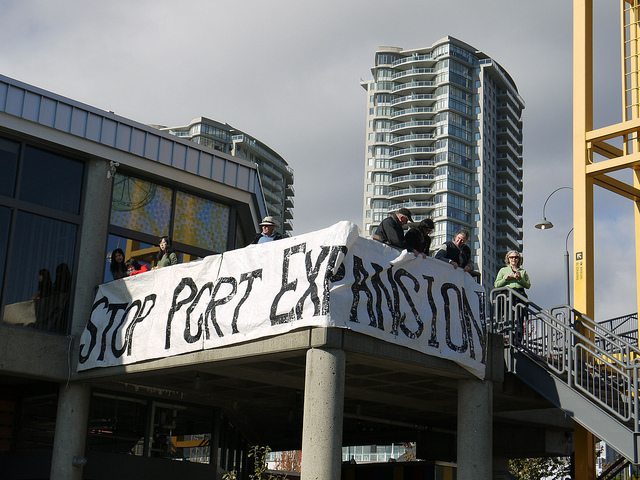On May 26, the Sacred Trust, acting on behalf of the Tsleil-Waututh First Nation, released an 89-page Independent Assessment Report, about the proposed Kinder Morgan pipeline. The comprehensive report, which incorporated the findings of six expert reports, conclusively opposes the pipeline proposal.
The proposal includes two pipelines and an expansion of the Westridge Marine Terminal in Burnaby. Kinder Morgan seeks to transport 890,000 barrels a day, in the two proposed pipelines between Edmonton and Burnaby. The terminal expansion would include an increase of traffic from 60 to 408 tankers per year.
The Independent Assessment Report includes Indigenous legal traditions, archaeological, environmental, and scientific analysis. It concludes that the Kinder Morgan tanker and pipeline expansion would likely have a devastating effect should a terminal be built on the shores of Metro Vancouver.
Included in this report is a recently released evaluation by Dr. Thomas Gunton and Sean Broadbent, who evaluated the Kinder Morgan’s spill risk assessment method in 2013, concluding that the expansion proposal has a 99 per cent risk of pipeline and tanker spills, when it is examine using standard methodology.
The report also concludes that the pipeline spills could result in significant damage costs that exceed existing compensation schemes.
“It is a complicated and difficult issue to clean up these spills. When an oil spill occurs there are all kind of damages that flow from it. There is no way to know how much it will cost,” said Harry Wruck, a lawyer at Ecojustice in Vancouver who has vast experience in oil-spill clean-up work.
This Independent Assessment Report is unlike any other released to date.
“The assessment as produced by the nation involves a number of experts, an inter-disciplinary and holistic review, which looks at the biophysical, cultural, and economy,” said Eugene Kung, a lawyer for the Sacred Trust.
The report is the first of its kind to be grounded in Indigenous legal principles. Firstly, that Tsleil-Waututh has a sacred obligation to protect, defend, and are stewards of the water, land, air and resources of the territory. Secondly, Tsleil-Waututh has a stewardship obligation which includes maintaining and restoring conditions in our territory that provide the environmental, cultural, spiritual and economic foundation. The third principle says that failure to be highly responsible in one’s actions toward the people, the earth, the ancestors and all beings has serious consequences.
The report concludes that the Kinder Morgan pipeline and expansion proposal does “not represent the best use” of land and resources for the present or future.
“The legal realities of constitutional and Aboriginal law suggests that consent is the new goal post for project proponents and the federal government. Moving from consultation from consent, this is a clear indication, that the nation is not consenting to this project,” said Kung.
“The Tsleil-Waututh does not have a declaration of [Aboriginal] title yet, but basically they are employing their own laws and Independent Assessment and came up with a decision, under their own laws they would not grant them access because it causes a great risk,” said Nicole Schabus, a Thompson River University law professor, in an interview.
“The Supreme Court of Canada says in Tsilhqot’in that if you get a Declaration of [Aboriginal] Title after a project goes ahead then the project might have to be reviewed. After the decision about title, if you want economic and legal uncertainty now then you should get the consent of Indigenous people,” she added.
“The report is a powerful, thoughtful and responsible example and manifestation of a Coast Salish peoples’ Indigenous legal order and tradition that makes clear to the Crown and third-parties what they can expect from First Nations governments decision-making and consent-based regulatory processes,” said Doug White (Kwulasultun Tliishin), a lawyer and Director of the Centre for Pre-Confederation Treaties and Reconciliation.
The National Energy Board heard from expert witnesses in the fall of 2013 and is expected to make recommendations by January of next year. The Federal Cabinet will take the set of recommendations and then decide on the pipeline and expansion.
On May 27, Tsleil-Waututh Nation filed the Independent Assessment, along with a council resolution adopting its findings and denying consent for the project in TWN territory as evidence of their opposition to the project. However, faith in the current federal government might be waning as indicated by lawyers from the Sacred Trust.
“Certainly, the Tsleil-Waututh Independent Assessment needs to be reconciled with Canadian law decision that happens. This is not a decision for the National Energy Board to resolve, but likely the Supreme Court of Canada, or beyond. Meaning international law. This is essentially a conflict of law situation,” said Kung.
Christina Gray holds an Art History and Juris Doctor Degree from UBC and will be called to the bar in Ontario in June 2015. She is a proud member of Lax Kw’alaams Tsimshian Band, and is also Dene from Lutselk’e, and of Metis descent.



